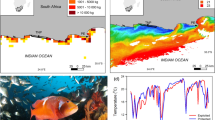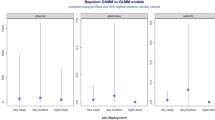Abstract
THE terns are a group of largely marine fish-feeders, many of which obtain their prey by skilful air-to-water plunge diving. Previous observers have assumed that light winds and rippling of the water surface either have no effect1 on the fishing success of terns or else are detrimental2, but there has been no direct evidence to support either view. To investigate this problem, a study of Sandwich terns (Sterna sandvicensis) and common terns (Sterna hirundo) was carried out in Northumberland, England.
This is a preview of subscription content, access via your institution
Access options
Subscribe to this journal
Receive 51 print issues and online access
$199.00 per year
only $3.90 per issue
Buy this article
- Purchase on Springer Link
- Instant access to full article PDF
Prices may be subject to local taxes which are calculated during checkout
Similar content being viewed by others
References
Salt, G. W., and Willard, D. E., Ecology, 52, 989 (1971).
Howard, D. V., Mass Audubon, 53, 2 (1968).
Boecker, M., Bonn. zool. Beitr., 18, 15 (1967).
Dunn, E. K., thesis Univ. Durham, (1972).
Whitlock, F. L., Emu, 26, 154 (1927).
Pettingill, O. S., Auk, 56, 420 (1939).
Phillips, G. C., thesis, Univ. Oxford (1962).
Author information
Authors and Affiliations
Rights and permissions
About this article
Cite this article
DUNN, E. Changes in Fishing Ability of Terns associated with Windspeed and Sea Surface Conditions. Nature 244, 520–521 (1973). https://doi.org/10.1038/244520a0
Received:
Revised:
Issue Date:
DOI: https://doi.org/10.1038/244520a0
This article is cited by
-
Design and Theoretical Research on Aerial-Aquatic Vehicles: A Review
Journal of Bionic Engineering (2023)
-
Importance of shallow river topography for inland breeding Common Terns
Journal of Ornithology (2023)
-
Survival and local recruitment are driven by environmental carry-over effects from the wintering area in a migratory seabird
Oecologia (2015)
-
Windscapes shape seabird instantaneous energy costs but adult behavior buffers impact on offspring
Movement Ecology (2014)
-
To eat or to feed? Prey utilization of Common Terns Sterna hirundo in the Wadden Sea
Journal of Ornithology (2011)
Comments
By submitting a comment you agree to abide by our Terms and Community Guidelines. If you find something abusive or that does not comply with our terms or guidelines please flag it as inappropriate.



